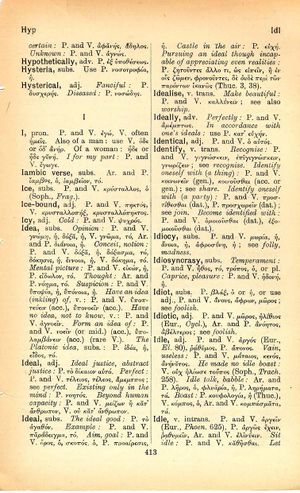idea: Difference between revisions
Πολλῶν ὁ καιρὸς γίγνεται διδάσκαλος → Rebus magistra plurimis occasio → Zum Lehrer wird für viele die Gelegenheit
(6_7) |
(D_4) |
||
| Line 13: | Line 13: | ||
{{Lewis | {{Lewis | ||
|lshtext=<b>ĭdĕa</b>: ae, f., = ιδέα,<br /><b>I</b> a (Platonic) [[idea]], [[archetype]], Sen. Ep. 58 med. (in Cic. Or. 3, 10; id. Ac. 1, 8, 30; id. Tusc. 1, 24, 58, as Greek). | |lshtext=<b>ĭdĕa</b>: ae, f., = ιδέα,<br /><b>I</b> a (Platonic) [[idea]], [[archetype]], Sen. Ep. 58 med. (in Cic. Or. 3, 10; id. Ac. 1, 8, 30; id. Tusc. 1, 24, 58, as Greek). | ||
}} | |||
{{Gaffiot | |||
|gf=<b>ĭdĕa</b>,¹³ æ, f., idée [de [[Platon]], type des choses : Sen. Ep. 58, 18 ; [Cicéron garde le mot grec [[ἰδέα]] : Cic. Ac. 1, 20 ; Tusc. 1, 58 ]. | |||
}} | }} | ||
Revision as of 06:36, 14 August 2017
English > Greek (Woodhouse)
subs.
Opinion: P. and V. γνώμη, ἡ, δόξα, ἡ, V. γνῶμα, τό, Ar. and P. διάνοια, ἡ. Conceit, notion: P. and V. δόξα, ἡ, δόξασμα, τό, δόκησις, ἡ, ἔννοια, ἡ, V. δόκημα, τό. Mental picture: P. and V. εἰκών, ἡ, P. εἴδωλον, τό. Thought: Ar. and P. νόημα, τό. Suspicion: P. and V. ὑποψία, ἡ, ὑπόνοια, ἡ. Have an idea (inkling) of v.: P. and V. ὑποπτεύειν (acc.), ὑπονοεῖν (acc.). Have no idea, not to know, v.: P. and V. ἀγνοεῖν. Form an idea of: P. and V. νοεῖν (or mid.) (acc.), ὑπολαμβάνειν (acc.) (rare V.). The Platonic idea, subs.: P. ἰδέα, ἡ, εἶδος, τό.
Latin > English (Lewis & Short)
ĭdĕa: ae, f., = ιδέα,
I a (Platonic) idea, archetype, Sen. Ep. 58 med. (in Cic. Or. 3, 10; id. Ac. 1, 8, 30; id. Tusc. 1, 24, 58, as Greek).
Latin > French (Gaffiot 2016)
ĭdĕa,¹³ æ, f., idée [de Platon, type des choses : Sen. Ep. 58, 18 ; [Cicéron garde le mot grec ἰδέα : Cic. Ac. 1, 20 ; Tusc. 1, 58 ].

